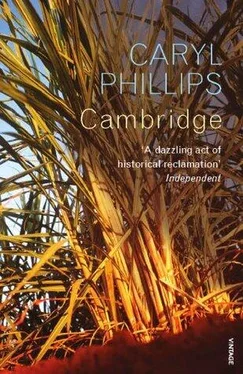Caryl Phillips - Cambridge
Здесь есть возможность читать онлайн «Caryl Phillips - Cambridge» весь текст электронной книги совершенно бесплатно (целиком полную версию без сокращений). В некоторых случаях можно слушать аудио, скачать через торрент в формате fb2 и присутствует краткое содержание. Год выпуска: 2009, Издательство: Vintage Digital, Жанр: Современная проза, на английском языке. Описание произведения, (предисловие) а так же отзывы посетителей доступны на портале библиотеки ЛибКат.
- Название:Cambridge
- Автор:
- Издательство:Vintage Digital
- Жанр:
- Год:2009
- ISBN:нет данных
- Рейтинг книги:5 / 5. Голосов: 1
-
Избранное:Добавить в избранное
- Отзывы:
-
Ваша оценка:
- 100
- 1
- 2
- 3
- 4
- 5
Cambridge: краткое содержание, описание и аннотация
Предлагаем к чтению аннотацию, описание, краткое содержание или предисловие (зависит от того, что написал сам автор книги «Cambridge»). Если вы не нашли необходимую информацию о книге — напишите в комментариях, мы постараемся отыскать её.
Cambridge — читать онлайн бесплатно полную книгу (весь текст) целиком
Ниже представлен текст книги, разбитый по страницам. Система сохранения места последней прочитанной страницы, позволяет с удобством читать онлайн бесплатно книгу «Cambridge», без необходимости каждый раз заново искать на чём Вы остановились. Поставьте закладку, и сможете в любой момент перейти на страницу, на которой закончили чтение.
Интервал:
Закладка:
Arnold and I continued our skyward journey in silence, which gave me the opportunity to survey the beauty of the abundant flora all around. The hill was shaded with trees, the master of which was the carnation. On account of its not growing above ten feet high, this tree can be numbered among those aromatic shrubs which exhale the most agreeable fragrances. Its dark crimson flowers were observed to be often spotted with white, its leaves a cool and inviting dark green. Among the other species were the passion flowers, which grew in every hedge and twined around every tree. The passion fruit is a speciality of the tropical table, and everywhere I observed both fruit and flower jointly ornamenting the bush.
Presently we arrived at a grassy clearing where Arnold instructed two negro servants, Glasgow and Bo, who had travelled independently to rendezvous with us here. They unpacked in silence and began to prepare our luncheon. Arnold and I wandered some twenty yards to the west and discovered a picturesque, shaded, though now deserted cottage, which had the great advantage of a magnificent prospect over the ocean. Hawthorn Cottage, explained Arnold, formerly belonged to a French family who in the earlier days of settlement, when it was imperative for those who suffered religious persecution to find some part of the earth where they might feel safe, happened upon this tropical haven. In recent years the cottage has lain abandoned in this perfect wilderness, allowing tall grasses and climbing weeds unchallenged domain. Yet, despite the bat and the lizard, and other less pleasant creatures who have made it their own, Hawthorn Cottage has remained popular as a picnic site, although rarely do such al fresco groups intrude upon one another in this well-concealed location. Arnold suggested that while our black pair completed their task we might stroll through its deserted shell. Like the greater number of West Indian houses, the cottage was built with open rafters and unglazed windows, to allow maximum circulation of air and penetration of light. The wooden shutters (some of which hung sadly) would be raised during the day by means of a long stick, and at night the stick would be withdrawn and the shutter attached to the window-ledge by means of a hook to an eye. The earthen floor was much in need of repair, and it was evident that the chimney would probably deny passage to any smoke, although in this climate it was unlikely that fires would often be lit. But this aside, the cottage appeared functional and somewhat inviting. I lingered awhile until we were disturbed by the ail-too familiar bray of negro voices.
In order that we might guard against the intrusion of disagreeable flying pests, as was customary, we employed both our blacks to stand over us while we took luncheon, bearing large pendant branches of the coconut. These they took in their broad negro paws, and waved this foliage backwards and forwards creating a pleasing fragrance while at the same time raising a gentle breeze. I ate quickly, and with the happy appetite of one exhausted by adventurous labour. Arnold turned the conversation back beyond the unpleasantness of the poor white negroes, to the nature of the slave-court, and shared with me his views on the punishment of negroes. 'Judicious firmness' might be a summary of his feelings on this issue, but on one point he was adamant. And this was that only he, among the white men of our plantation, should presume to strike a negro with the omnipotent lash, no matter how great the offence. In addition, no abusive language, as distinct from physical punishment, should be used against them. Clearly Arnold took it upon himself to be the sole authority when it came to justice for the negro. He informed me that he had already discharged one book-keeper on this account, for in a dispute with an African named Israel, the book-keeper had not only kicked the unfortunate negro but had the insolence to assault him with the name, 'dirty nigger'. Apparently the black, Israel, came the next day to see Arnold and made an earnest petition. Four eye-witnesses were summoned, examined separately, and the truth of Israel's ill-usage proved. The villifier of the negro remained steadfast in his denial of the assault, but he was discharged after being told that his possession of a white skin was no ground for belief in his word over the negro's. According to Arnold the negroes celebrated this decision for several days.
Unfortunately, sooner than either of us could have possibly imagined, an opportunity presented itself for the testing of Arnold's theories on negro punishment. We returned to the plantation in the late afternoon, travelling the greater part of our upward journey beneath the dense roof of branches which allowed the penetration of only the occasional dim shaft of sunlight. These rare beams splashed on the thin, dusty track,' forming small circular pools of light whose shimmer provided the illumination by which we picked our slow way home. No sooner had we stepped from the carriage than we were greeted by a young overseer who was anxious to explain how he had caught the huge negro, Cambridge, purloining meat. Some words had been exchanged during which our man accused of theft apparently insulted the overseer. Hearing this account a tight-lipped Arnold departed in search of the black criminal, and returned some minutes later in a rage and claiming loudly for all to hear that he had been the victim of unprovoked aggression. Arnold decided to act immediately and enquired as to whether I wished to observe his court in session. I said I did, and together we retired to the level beneath the piazza where the accused Cambridge and the offended overseer soon presented themselves.
The two issues at stake were, firstly, whether or not Cambridge had stolen the meat and, secondly, whether he had insulted the overseer. That he had committed a further heinous crime of laying hands upon Arnold was beyond doubt, evidenced by my companion's enraged condition. To the second charge the grey-haired black offered no defence. To the first he claimed that he was not stealing, for come Sunday he intended to replace the meat with stock from his own provisions. Arnold asked why permission was not sought to remove the meat if, as he claimed, it would presently be replaced. Cambridge answered, in his polite English, that should permission be sought for every insignificant act then there would be precious little time for work on the plantation. Arnold replied that not everyone was as honest as Cambridge claimed to be, and that only if they were so would such a system be workable. Cambridge then adopted the manner and speech of one familiar with the conventions of the bar and claimed the status of trustee, indicating that it was a much lesser position than that of Head Driver, an office which I was astonished to hear him claim he had twice refused. At this point our junior overseer laughed out loud, remarking that the black's insubordinate nature made him ill-suited to the office of trustee, but not wishing to be seen to be in opposition to his superior, Mr Brown, he essayed no opinion on Cambridge's capacity to perform the elite role of Head Driver. With time passing, and the argument in danger of becoming circular in form, Arnold decreed that he would suspend judgement. He was concerned that he should not be accused of acting in the heat of the moment, and imposing a wrong verdict in so delicately balanced a case. I have to confess that his decision bore strong witness to the efficacy of my influence, for I feared an instant ruling might ruin the pleasantness of the day we had just spent together. I therefore concurred enthusiastically with his decision, and a conclusion, although not altogether satisfactory, and certainly temporary, was achieved.
At this intermission everybody, the presence of Arnold and myself notwithstanding, retired to their respective quarters. I have still not accustomed myself to the alarming speed with which the tropical day gives way to night, ignoring the lingering deepening of the blue to which those of England are familiar. I stood by the window to my bed-chamber and watched the last embers of daylight the out in dusky red streaks along the horizon, and marvelled as the red ball of the sun buried herself in the heart of the ocean. After the great heat of the day the delightful occasion was to be enjoyed. The possession of an expansive view of the ocean adds greatly to the attractions of the scene, but this theatre seems never truly complete until I descry the image of the mist-bedimmed moon atop the watery world. Only then am I ready to drag my weary bones into my cot, and for many an hour surrender to the feverish caprices of an ill-ventilated dreamworld. And to dream of what? England, of course. And a life sacrificed to the prejudices which despise my sex. Of loneliness. Of romance and adventure. Of freedom.
Читать дальшеИнтервал:
Закладка:
Похожие книги на «Cambridge»
Представляем Вашему вниманию похожие книги на «Cambridge» списком для выбора. Мы отобрали схожую по названию и смыслу литературу в надежде предоставить читателям больше вариантов отыскать новые, интересные, ещё непрочитанные произведения.
Обсуждение, отзывы о книге «Cambridge» и просто собственные мнения читателей. Оставьте ваши комментарии, напишите, что Вы думаете о произведении, его смысле или главных героях. Укажите что конкретно понравилось, а что нет, и почему Вы так считаете.












